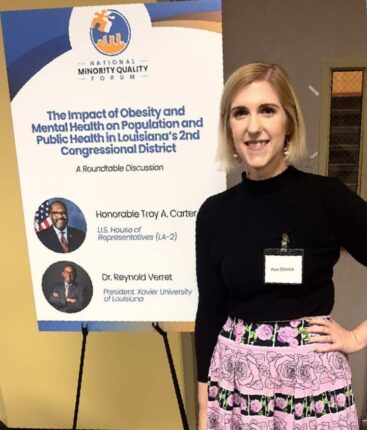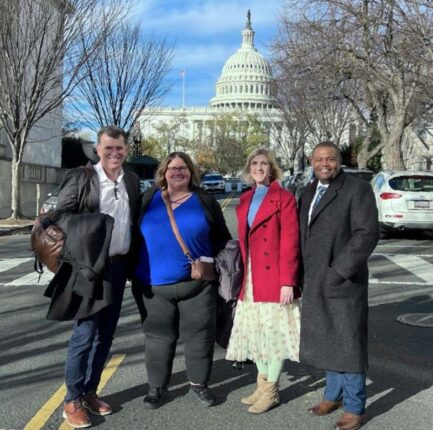
OAC Community Perspectives: Making the Case for Change by Ava Zebrick
Meet Ava Zebrick, a powerhouse within the Obesity Action Coalition (OAC) whose intelligence, education and determination are the driving forces behind her advocacy work. Behind her calm exterior is a sharp mind and a relentless advocate who is dedicated to changing how society understands and treats obesity.
Like many of us, Ava’s experiences with obesity began at an early age, significantly shaping who she grew up to be. Today, Ava not only advocates for others affected by obesity but also incorporates the pursuit of health into her full-time job. Both her career and her advocacy work help hold her accountable in her ongoing weight management journey. Ava is also actively involved within the OAC, having served on numerous volunteer committees like the Access to Care and Convention Planning Committees.
In this interview, Ava opens up about the struggles and obstacles she’s faced, pushing for policy reforms and challenging beliefs about obesity.
Can you share more about your journey with obesity?
I’ve struggled with overweight and obesity since childhood. In my early 20s, I faced health issues like hypertension, high cholesterol, pre-diabetes, clinical depression and polycystic ovarian syndrome (PCOS). However, my biggest struggle was with self-hatred due to internalized weight bias. No one was more vicious than I was towards myself.
At 25, I hit rock bottom in a doctor’s office, looking at an x-ray as he told me my kneecaps were out of place. If physical therapy didn’t help, he would recommend knee surgery. The realization that I was facing knee surgery at 25 years old was life-changing, leading me to seek bariatric surgery to treat my obesity and reclaim my health.
One defining moment occurred in 2014 when I discovered the OAC through my surgeon’s weekly support group meetings. It was during one of these gatherings that I learned about the upcoming Your Weight Matters Convention. Eager to learn more, I traveled to the event with a close friend from my support group.
During the Convention’s keynote speech, I was struck by a revelation: obesity was described as a disease for the first time in my experience. In the same presentation, I learned that managing this condition was incredibly challenging, and those who made health their job tended to be the most successful in the long run. From that moment on, I had both a diagnosis and a prescription: I needed to make health my job.
Within a year of attending the Convention, I enrolled in a master’s program in healthcare management, began working as a patient partner in health research, and actively engaged in obesity advocacy. Within another year, my efforts were recognized when I received the OAC’s Barbara Thompson Award for Advocacy.
You have faced numerous healthcare battles in your quest for science-based obesity care. What have been some of the barriers you’ve encountered?
Among the most challenging barriers has been the lack of insurance coverage. When I first sought care, despite meeting the criteria for bariatric surgery, the insurance provided through my husband’s employer didn’t cover surgical treatment for dependents. Similarly, the plan through my employer excluded obesity care “regardless of medical necessity.” I’ll never forget that sentence.
These limitations led me to seriously consider medical tourism, contemplating bariatric surgery in Mexico for a lower cost. However, I ultimately had surgery local to me, which resulted in significant medical debt. Even now, a decade later, I still require ongoing medical support for managing my health. Unfortunately, my insurance, now through a different employer, continues to lack coverage for comprehensive obesity care.
How can raising awareness about obesity as a disease change public perceptions and reduce stigma? How does this awareness benefit individuals?
 Understanding obesity as a disease reveals its complex causes and the physiological processes making it difficult to manage, which helps shift us away from blaming individuals. This realization can free people from internalized bias and the shame of obesity being their fault.
Understanding obesity as a disease reveals its complex causes and the physiological processes making it difficult to manage, which helps shift us away from blaming individuals. This realization can free people from internalized bias and the shame of obesity being their fault.
Presenting obesity as a disease in healthcare settings shifts the conversation away from what is all too common: “You are obese. Go do this and that, and I want you to weigh this by the next time I see you.” In my case, my repeated failure to do so drove me to avoid seeking healthcare altogether.
Instead, patients should be given a diagnosis and the offer of partnership: “You have obesity. It’s a chronic disease that is difficult to manage because there are processes in the body that make it hard to lose weight. But we have effective tools in the toolbox to help, and I am here to support you.”
Had I understood this earlier and received proper support from my doctors, I would not have gotten as sick as I did.
Your advocacy work on both Capitol Hill and with local elected officials is inspiring. Can you highlight some of the key initiatives you’ve been involved in and the changes you hope to see in obesity care and treatment?
 Storytelling is a powerful part of advocacy. Personal stories can change hearts and minds, and so I share mine when making the case for change. I want to see the whole continuum of care for obesity accessible to those like me who need them, including behavioral therapy, medications and bariatric surgery.
Storytelling is a powerful part of advocacy. Personal stories can change hearts and minds, and so I share mine when making the case for change. I want to see the whole continuum of care for obesity accessible to those like me who need them, including behavioral therapy, medications and bariatric surgery.
On Capitol Hill, I advocate for the Treat and Reduce Obesity Act (TROA), aiming to enhance access to obesity care nationwide. This bill seeks to broaden reimbursement eligibility for behavioral therapy and extend coverage to anti-obesity medications.
Additionally, I’ve participated in local roundtable policy sessions, such as “The Impact of Obesity and Mental Health on Population and Public Health,” where solutions were discussed.
In your years in advocacy, have you noticed any positive shifts or heightened awareness regarding the significance of obesity care?
Insurance provided by my husband’s employer now includes coverage for bariatric surgery for spouses, albeit not yet for dependent adult children on the plan. Additionally, since my initial visits to Capitol Hill, I’ve noticed a significant familiarity among legislative staff with the Treat and Reduce Obesity Act (TROA), the very legislation we advocate for. We rarely have to explain the objectives of the bill.
As someone who has experienced the persistent challenges of obesity, what advice would you give to others navigating similar struggles in maintaining weight loss or managing their condition over time?
Obesity is complex and difficult to manage. Everybody’s body is different, and no one tool will work forever. I strongly recommend seeking the care of a Board-Certified Obesity Medicine Specialist. My primary care provider holds this specialty, but ideally, my whole team would be certified. These healthcare providers undergo extensive education and training to care for patients like us. You can use the OAC’s Find a Provider directory to locate one near you at obesitycareproviders.com.
Do You Want to Share Your Story or Be Interviewed?
Whether you have a story about navigating obesity, facing weight stigma or inspiring others, your voice is important. If you want to share your story to support, inspire or encourage others, please email membership@obesityaction.org. The power of your voice can light up a future issue of Weight Matters Magazine!


